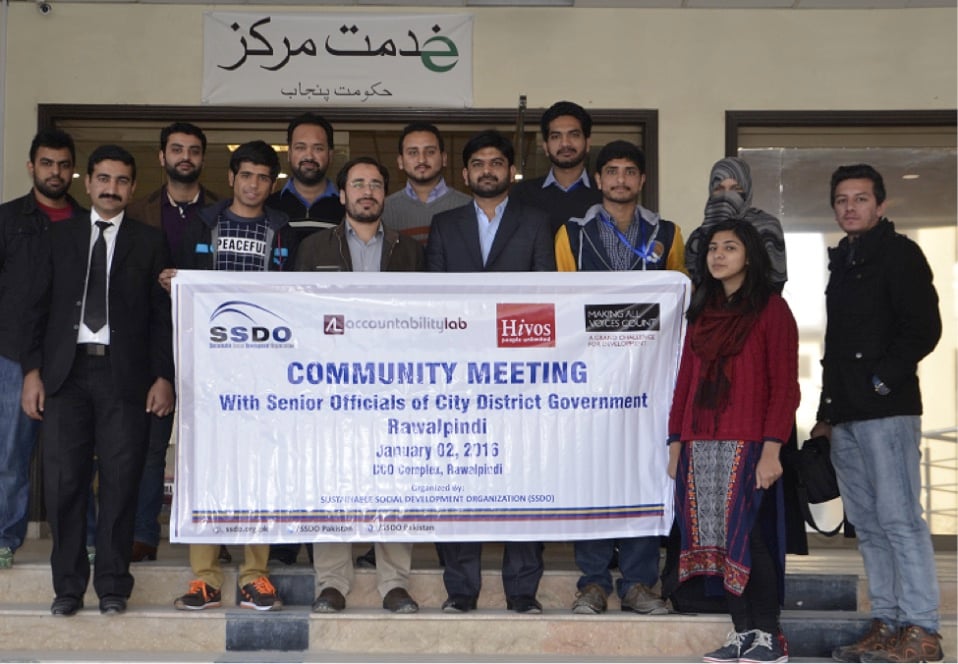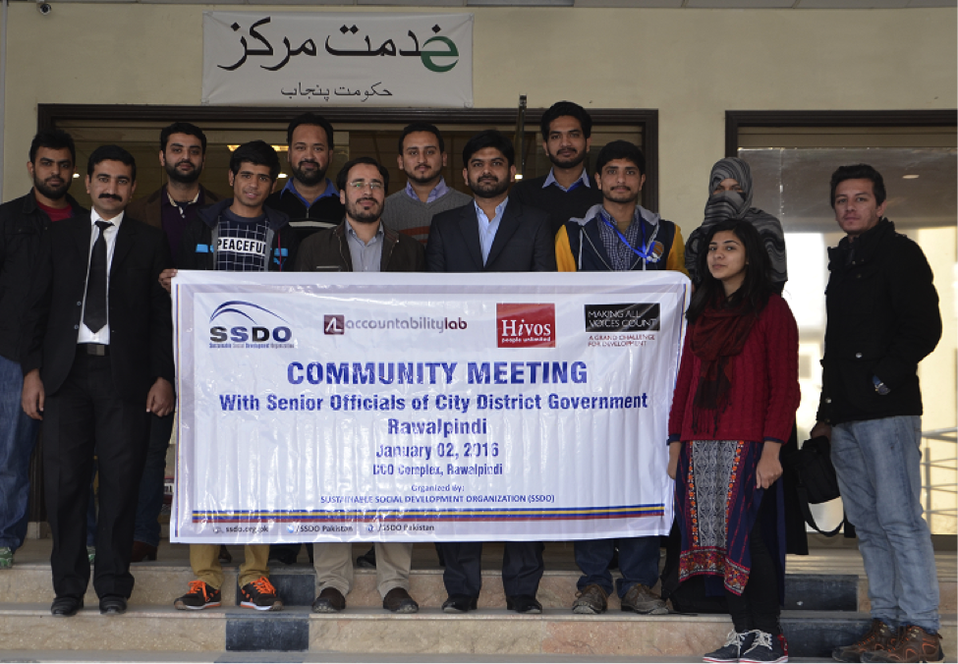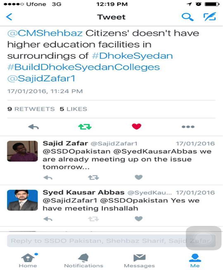NEWS
February 3, 2016

IN BRIEF
Making Our Voices Count: Youth Efforts to Close Feedback Loops on Service Delivery in Pakistan By: Fayyaz Yaseen, Syed Kausar Abbas, and Rafia Malik. Working Against the Grain with Young People The power dynamics that lead to mis-governance are deep set in Pakistan, and on first glance it might seem like there is very little that motivated young people can do to fix systematic patronage and graft. But at the Accountability Lab and the Sustainable Social Development Organization (SSDO), we have been working with a group of young volunteers in Rawalpindi recently on a project that shows just how far energy and a […]
SHARE
Making Our Voices Count: Youth Efforts to Close Feedback Loops on Service Delivery in Pakistan

By: Fayyaz Yaseen, Syed Kausar Abbas, and Rafia Malik.
Working Against the Grain with Young People
The power dynamics that lead to mis-governance are deep set in Pakistan, and on first glance it might seem like there is very little that motivated young people can do to fix systematic patronage and graft. But at the Accountability Lab and the Sustainable Social Development Organization (SSDO), we have been working with a group of young volunteers in Rawalpindi recently on a project that shows just how far energy and a commitment to accountability can go. Three months ago- with support from Making All Voices Count (MAVC)- we selected this group from local universities after an open application process, and proudly named them “Accountability Ambassadors” in their communities.
What Did We Set Out To Learn?
We wanted to understand whether a group of young people could close the loop on key service delivery challenges themselves by exerting pressure on public officials to fix problems through social and traditional media. We then wanted to understand if they could monitor the results to ensure sustainability of the reforms.
We began by training the Ambassadors on everything from accountability dynamics to feedback loops to social media techniques. We also worked with them to understand from their perspective what the key blockages are to the effective delivery of services in Rawalpindi (starting with education). There were three key problems. First, decision-makers such as District Education Officials were often unaware of some of the appalling conditions in schools. Second, when they were aware, they were often unwilling to listen to citizen complaints and would direct public funds to projects that were more politically beneficial. Third, even when they were willing to take action, the mandate, funds or both were unavailable to close the loop on problems.
What Progess Did We Make?
Our Ambassadors immediately set out to address these challenges directly. First, they fanned out across the city, engaging students in 55 schools through conversations around their rights and responsibilities and the need to take action. Second, they took photographs of the conditions in schools- including the absence of drinking water, desks and toilets – and spoke to Principals about the problems. They then reported all of this publicly on Twitter, tagging all relevant decision-makers (including the Chief Minister, provincial and local officials) within government using hashtags such as #educationforall. Third, they launched a media campaign with local newspapers, releasing a number of articles documenting their findings and their ideas for fixing the problems. The Deputy Commissioner of the District finally took notice and invited the Accountability Ambassadors for a series of meetings to listen to their complaints and begin to think about possible solutions. This pressure led to a series of pledges for reform.
Here in Pakistan we’ve read plenty of evidence about how transparency does not automatically lead to accountability; and how political will for change can be elusive even when decision-makers are shown clear evidence of the need for change. We are not going to let the bureaucrats of Rawalpindi away that easily! The Accountability Ambassadors mobilized to monitor the promises that have been made by the local officials and this is leading to tangible results. For example, the campaign has resulted in newly renovated drinking water facilities at one school within 10 days. Now, given the success and media around the initiative, the group of Ambassadors is growing; and the group has been invited to sign a Memorandum of Understanding with the district government for ongoing monitoring not just of schools, but of public health facilities in Rawalpindi. They were also asked – and have just completed – a series of orientation sessions for Members of the Provincial Assembly (MPAs) on citizen inputs to fill constitutional gaps around service delivery issues. These inputs will now be taken by the MPAs for discussion at the provincial assembly of Punjab.
What Have We Learned?
This project has been an incredible learning experience. We have seen a number of key lessons emerge that might be relevant as we think about next steps, and for accountability initiatives in other contexts. We’ve learned that it is not impossible for a group of committed young people to close the loop on key service delivery challenges by exerting pressure on decision-makers. Additionally, there seem to be three key lessons from this work to date:
First, transparency isn’t all about data. Open government initiatives tend to focus on opening up reams of information. Our Ambassadors created transparency not through holding decision-makers to account for specific plans or amount of dollars budgeted, but by documenting problems through widely shared photos. They realized that making transparency visual can be very powerful.
Second, a well-planned media campaign around social accountability can lead to positive results. We learned that when young people are organized and speak with one voice publicly and consistently, it is hard for government officials to ignore. In fact, it can begin to reach a critical mass whereby the political calculations of those in power begin to change, and they realise they can use these kinds of initiatives to win support.
Finally, commitment is critical – three months and some small fixes are certainly not shifting the power dynamics in Pakistan we mentioned above entirely. We have also had some challenges with consistency, given the other commitments and social constraints that our student Ambassadors tend to face, and the sustainability of all of this is still to be seen. But the Ambassadors understand that this is going to take continued pressure to ensure improvements in lives over time, and their enthusiasm for the cause is infectious.
Next Steps
The progress so far has filled the Ambassadors with confidence in their ability to make their voices count. In the next phase of the project, they will continue to monitor schools and health facilities in Rawalpindi. They also plan to hold public meetings to discuss district development agendas and budget allocations with community members, political leaders and public officials. We will provide continued support, guidance and training. We will keep you updated on progress over time- but if this is what a small group can achieve in three months, we have high hopes for the future!
Fayyaz Yaseen is the Country Representative for the Accountability Lab in Pakistan (@AccountLab), Syed Kausar Abbas is the Executive Director of the Sustainable Social Development Organization (SSDO) (@SSDOPakistan), and Rafia Malik is an Accountability Ambassador as part of this project.


